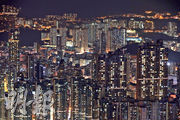Road to 5**:Hot nights increase risk of death
【明報專訊】◆News summary
According to data from the Hong Kong Observatory, July 2020 was the hottest month in Hong Kong since 1884. There were 21 hot nights altogether–when the lowest temperature is 28℃ or above–11 of which were consecutive days.
◆Source A
Through analyzing data from 2006 to 2015, the Institute of Future Cities at The Chinese University of Hong Kong(CUHK)and local experts discovered that hot nights increased the risk of death by 2.43%, and five consecutive hot nights increased risks of death by 6.66%. Research Assistant Professor Ka Lun Lau at the institute says that the human body rests during nighttime, yet hot nights render the human body unable to recover, and higher temperatures also affect one's sleeping quality.
Studies also find that, in addition to Causeway Bay and Mong Kok, new towns such as Tsuen Wan, Yuen Long, and Tin Shui Wai have been hit hardest by hot nights. According to Ka Lun Lau, heat is easily contained within the narrow streets of urban areas. In the New Territories, it is generally hot during the day due to the abundance of highways, as asphalt roads also absorb heat easily. Furthermore, it is farther from the seashore, resulting in slower heat dissipation. The dense buildings in some new towns also prevent heat from dissipating, causing high temperatures to persist into the night.
(Source: Ming Pao, 2020.09.14)
■Mock examination question
Explain the negative impacts of hot nights on citizens' quality of life in Hong Kong and possible factors leading to an increase in hot nights with reference to the data provided.
1. Personal health
According to the data provided, hot nights are defined as nights when the lowest temperature is 28℃ or above. The human body rests at nighttime. While hot nights render the human body unable to recover from the day's activities, high temperatures also affect one's sleeping quality, thus indirectly influencing daily life by creating negative impacts on one's living quality.
2.Public health
Hot nights increase the risk of death by 2.43%, while five consecutive hot nights increase the risk of death by 6.66%. It can be seen that hot nights have a negative impact on citizens' personal health and public health.
Possible factors
One of the possible factors leading to an increase in hot nights in Hong Kong is improper urban planning. According to Research Assistant Professor Ka Lun Lau at the Institute of Future Cities at The Chinese University of Hong Kong, heat is easily contained within the narrow streets of urban areas, which is related to poor urban planning in Hong Kong in the early days. In addition, street designs that fail to comply with wind direction and the lack of trees and green areas also hinder air circulation, thus impeding urban heat dissipation.
Translated by Odyssey Lang
[通通識 第678期]









